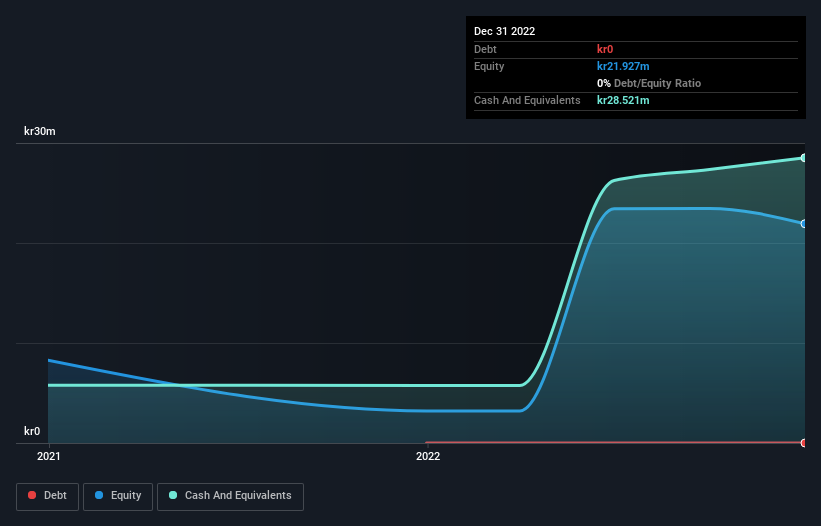Skolon (STO:SKOLON) Is In A Good Position To Deliver On Growth Plans
Even when a business is losing money, it's possible for shareholders to make money if they buy a good business at the right price. For example, although Amazon.com made losses for many years after listing, if you had bought and held the shares since 1999, you would have made a fortune. But while the successes are well known, investors should not ignore the very many unprofitable companies that simply burn through all their cash and collapse.
So should Skolon (STO:SKOLON) shareholders be worried about its cash burn? For the purposes of this article, cash burn is the annual rate at which an unprofitable company spends cash to fund its growth; its negative free cash flow. The first step is to compare its cash burn with its cash reserves, to give us its 'cash runway'.
Check out our latest analysis for Skolon
Does Skolon Have A Long Cash Runway?
A company's cash runway is calculated by dividing its cash hoard by its cash burn. In December 2022, Skolon had kr29m in cash, and was debt-free. Importantly, its cash burn was kr5.2m over the trailing twelve months. That means it had a cash runway of about 5.5 years as of December 2022. Even though this is but one measure of the company's cash burn, the thought of such a long cash runway warms our bellies in a comforting way. You can see how its cash balance has changed over time in the image below.

How Well Is Skolon Growing?
It was quite stunning to see that Skolon increased its cash burn by 30,838% over the last year. While that isa little concerning at a glance, the company has a track record of recent growth, evidenced by the impressive 64% growth in revenue, over the very same year. Considering both these factors, we're not particularly excited by its growth profile. Of course, we've only taken a quick look at the stock's growth metrics, here. This graph of historic revenue growth shows how Skolon is building its business over time.
How Easily Can Skolon Raise Cash?
While Skolon seems to be in a decent position, we reckon it is still worth thinking about how easily it could raise more cash, if that proved desirable. Generally speaking, a listed business can raise new cash through issuing shares or taking on debt. One of the main advantages held by publicly listed companies is that they can sell shares to investors to raise cash and fund growth. We can compare a company's cash burn to its market capitalisation to get a sense for how many new shares a company would have to issue to fund one year's operations.
Skolon's cash burn of kr5.2m is about 0.7% of its kr743m market capitalisation. That means it could easily issue a few shares to fund more growth, and might well be in a position to borrow cheaply.
So, Should We Worry About Skolon's Cash Burn?
It may already be apparent to you that we're relatively comfortable with the way Skolon is burning through its cash. For example, we think its revenue growth suggests that the company is on a good path. Although we do find its increasing cash burn to be a bit of a negative, once we consider the other metrics mentioned in this article together, the overall picture is one we are comfortable with. Looking at all the measures in this article, together, we're not worried about its rate of cash burn, which seems to be under control. An in-depth examination of risks revealed 1 warning sign for Skolon that readers should think about before committing capital to this stock.
Of course Skolon may not be the best stock to buy. So you may wish to see this free collection of companies boasting high return on equity, or this list of stocks that insiders are buying.
New: Manage All Your Stock Portfolios in One Place
We've created the ultimate portfolio companion for stock investors, and it's free.
• Connect an unlimited number of Portfolios and see your total in one currency
• Be alerted to new Warning Signs or Risks via email or mobile
• Track the Fair Value of your stocks
Have feedback on this article? Concerned about the content? Get in touch with us directly. Alternatively, email editorial-team (at) simplywallst.com.
This article by Simply Wall St is general in nature. We provide commentary based on historical data and analyst forecasts only using an unbiased methodology and our articles are not intended to be financial advice. It does not constitute a recommendation to buy or sell any stock, and does not take account of your objectives, or your financial situation. We aim to bring you long-term focused analysis driven by fundamental data. Note that our analysis may not factor in the latest price-sensitive company announcements or qualitative material. Simply Wall St has no position in any stocks mentioned.
About OM:SKOLON
Skolon
A Software as a Service (SaaS) company, develops a digital platform for schools.
Exceptional growth potential with excellent balance sheet.
Market Insights
Weekly Picks


Crazy Undervalued 42 Baggers Silver Play (Active & Running Mine)


Fiducian: Compliance Clouds or Value Opportunity?

Willamette Valley Vineyards (WVVI): Not-So-Great Value
Recently Updated Narratives

Moderation and Stabilisation: HOLD: Fair Price based on a 4-year Cycle is $12.08


Positioned globally, partnered locally


When will fraudsters be investigated in depth. Fraud was ongoing in France too.
Popular Narratives


MicroVision will explode future revenue by 380.37% with a vision towards success


NVDA: Expanding AI Demand Will Drive Major Data Center Investments Through 2026





